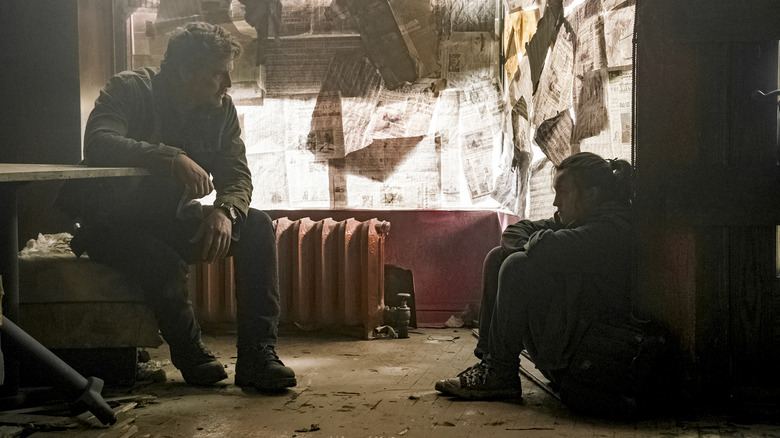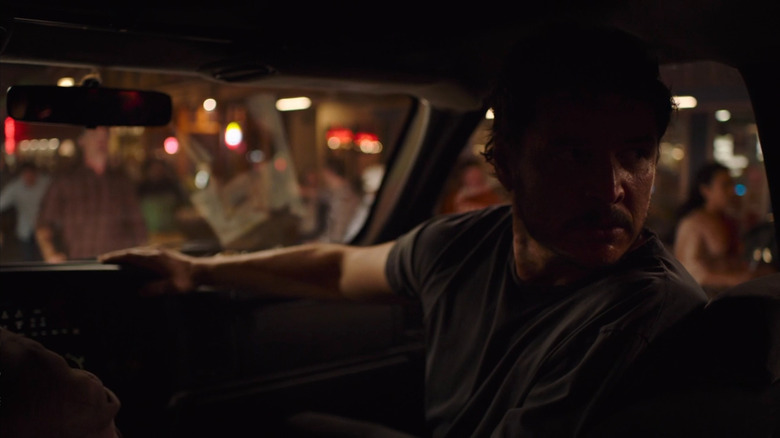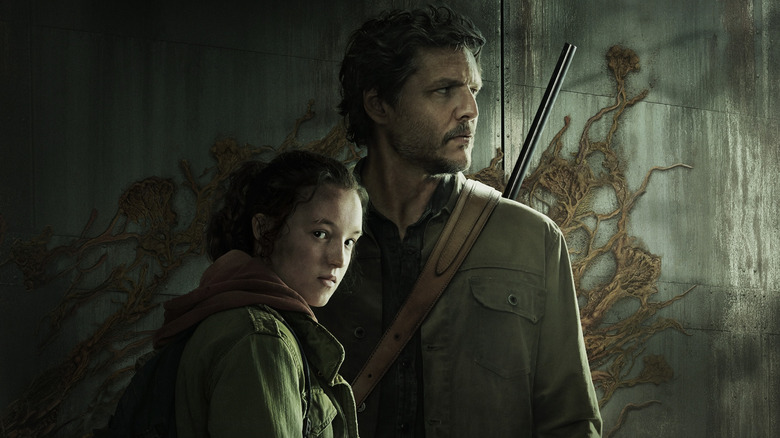The Last Of Us Cinematographer Reveals The Key To Those Joel And Ellie Car Scenes [Exclusive]
This post contains spoilers for HBO's "The Last of Us."
Since HBO's "The Last of Us" centers around a cross-country trip through a post-apocalyptic America, scenes involving characters in vehicles were inevitable. While much of Joel and Ellie's journey in these episodes has been on foot, the end of episode 3 shook things up by providing the duo with a vehicle. Thanks to this, we get some excellent road-movie material banter between Joel and Ellie early in episode 4. Capturing these scenes on camera proved to be a challenge for cinematographer Eben Bolter, but luckily this wasn't his first time filming vehicle-heavy scenes.
A lot of work goes into making the driving as realistic as possible while also putting the camera at an appealing angle, whether it be filmed in a vehicle on location or on a soundstage. Bolter's method was a combination of techniques, and when paired with the incredible on-screen chemistry between Bella Ramsey and Pedro Pascal, the end result was some of the best moments from the latest episode.
The problem of continuity
In an interview with /Film's Valerie Ettenhofer, cinematographer Eben Bolter spoke in detail about shooting the Joel and Ellie car scenes. Bolter would explain that the setting of a car limits what angles could be used, so framing became the most straightforward part of the task at hand. All that mattered was making sure that Joel and Ellie could be seen:
"I did a whole movie in a car. Shooting in cars is difficult as a cinematographer. First of all, there are only a few places the camera can be to see people's faces talking. It's very hard to be interesting visually. And it's very hard to innovate because everyone's tried everything, and certain things just work. So we didn't want to overcomplicate it; we wanted the cameras just to be in the right positions to tell the story and see the characters."
The biggest challenge for Joel and Ellie's scenes in a moving vehicle was continuity. While some of these moments could be shot on location, Bolter had to do a convincing job of making sure the viewers wouldn't be able to tell when soundstage work was also implemented:
"Where it was complicated for me was certain scenes we did out on the road, driving a real car, everything's real, everything's good, Boom. Put a camera on it. Great. In other scenes, we were in a studio, blue screen. Then my job becomes, how do I make this feel like we're not shooting on a soundstage?"
Consistency is key
Making the transition between actual and staged driving feel flawless was all a matter of imitating the constraints and problems that came with shooting inside an actual moving vehicle. While it could be tempting to make the conditions on a soundstage as perfect as can be for a great interior shot of the car, Bolter's approach was all about replicating external conditions:
"My philosophy to that [shooting on a soundstage] is to always introduce flaws. Because when we're out on the road, it's thumpier than you expect it to be; the light isn't quite in the perfect position. There are flaws, and many things are happening that are faults if you like. So, on a stage, we have to put those faults back in."
Bolter found different creative ways to mimic real-life driving conditions, whether creating "bounce rigs for the car" or making sure that he wasn't "glamorizing the lighting too much." Aside from all the technical aspects of creating the car scenes, the chemistry between Bella Ramsey and Pedro Pascal just elevates the scene to a whole other level. As Bolter previously mentioned, there are only so many ways to get a camera shot inside of a car, so it's the performance of the actors that makes it truly unique:
"The characters, you know, the actors are just so great, the dialogue's so good that as long as we're in the right position and I've done all of those things, the scene's gonna work. I think the dialogue and the actors do more of the heavy lifting there than I do."
Bolter's humility in giving the actors all the credit for the car scenes in episode 4 of HBO's "The Last of Us" speaks to the level of collaboration in the show's production. While the actors are essential in making these driving scenes so engaging and remarkable, Bolter's incredible attention to detail helps keep viewers immersed in the first place. At the end of the day, it's all about consistency, whether shooting outside or on a stage.


